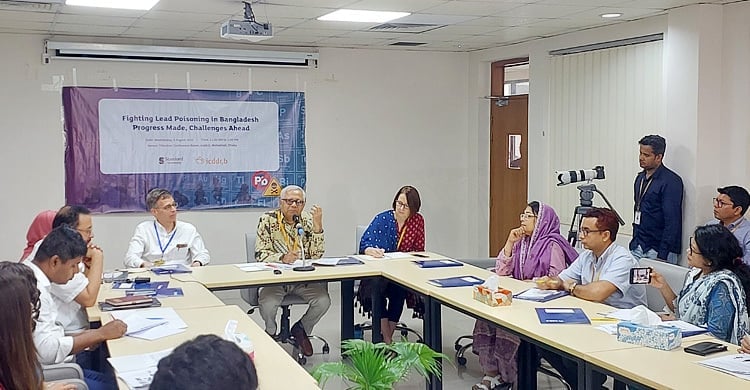News Flash
News Flash

DHAKA, Aug 6, 2025 (BSS) - Public health experts have called for undertaking urgent steps to protect children from lead pollution terming it as a deadly toxic heavy metal silently harming the health of millions of people, especially children and pregnant women.
This was revealed at a discussion titled “Prevention of Lead Pollution in Bangladesh: Progress and Challenges” organized by the International Centre for Diarrhoeal Research, Bangladesh (ICDDR,B) in the capital today.
The US Centres for Disease Control and Prevention considers the presence of lead in children’s blood above 35 micrograms per litre which is alarming.
Besides, the UNICEF said, “Bangladesh is the fourth most affected country in the world with lead pollution where about 03.60 crore children have high levels of lead in their blood.”
ICDDR,B Senior Director Dr. Sarah Salway said, “Lead pollution is a major public health problem in Bangladesh. It often escapes our attention. Children living in areas near polluting industries are the biggest victims.”
A study conducted between 2009 and 2012 in Dhaka’s slums found that in blood 87 percent of children under 2 years had lead levels above 50 micrograms per litre.
During the discussion, Prof of Stanford University in the United States and former director of ICDDR,B Steve Luby said the lead severely impairs children’s brain development and reduces their intellectual abilities.
Project Coordinator of ICDDR,B Dr. Md Mahbubur Rahman said the main sources of lead pollution are lead and battery-related industries, lead-containing paints, cosmetics and cooking utensils.
He said positive progress has been made in preventing lead adulteration in turmeric used in cooking as in 2019, lead was found in 47 percent of samples while it dropped to almost zero in 2021.
Citing data from a study conducted between 2022 and 2024, ICDDR,B Assistant Scientist Dr. Jasmine Sultana said lead was found in the blood of every 500 children aged 2 to 4 in Dhaka and of those 98 percent had lead levels above the alarming level.
Executive Director of ICDDR,B Dr. Tahmid Ahmed said, “Lead poisoning is silently taking away the future prospects of our children. Therefore, we must determine to stop the sources of lead emissions so that every child can grow up healthy and intelligent.”
The discussants said it is possible to protect children from lead pollution by removing lead-acid battery manufacturing or recycling factories and establishments where lead is melted or burned.
Researchers from ICDDR,B and Stanford University and representatives from various media outlets took part in the discussion.